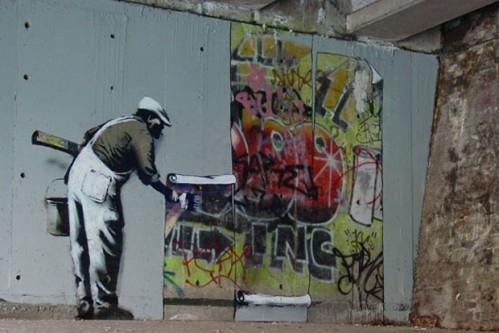Before Banksy's work became the object of desire for champagne-sipping, canapé-snaffling hedge fund managers at auction houses' private views, there was something of the curled lip about street art. Indeed, for years it wasn't known as street art but graffiti - the painted defacement of walls. London in the Noughties saw the evolution of that view: there could be a legitimate artistic value of this sort of work. However, not all graffiti qualified - much was still mindless vandalism. That is what Graffiti Wars on Channel 4 last night tackled: the battle between art and spray-painting, between intellectual execution and basic daubing.
Banksy was the king of the Noughties street art scene. His work was protected under perspex by local councils, gathered around by gaggles of tourists snapping away at the chambermaid lifting a wall to sweep dust underneath. He made amusing, allusive, subversive work which pleased the art crowd and the public alike. He was asked to do museum shows and monographs are written about him.
Robbo, by contrast, was the supreme Eighties tagger, who gained respect for his command of logistics: he knew how to gain unseen access to write his name on tubes and trains, winning a crosstown audience for his work, which, while prolific, has about as much artistic intent as a dog pissing on a lamp post. The voiceover suggested it was an expression of anger at society or the government, but I would hardly even credit it with that much integrity.
The incident that sparked this programme goes as follows: in the late Nineties, a young Banksy met Robbo at a pub and said he had no idea who he was; Robbo slapped him and said he'd never forget. Banksy denies this ever happened, but after Robbo published it in a book, Banksy painted over Robbo's last extant tag (pictured above). Incorporating another graffiti artist's work into your own without permission is an unspeakable sin in that world.
This caused a tit-for-tat campaign where Robbo would in revenge deface a work of Banksy's and Banksy - or one of his partisans - would counterpaint. Robbo's efforts were ugly, simple, unartistic, whereas Banksy's were elegant, witty ripostes. It was like watching Garry Kasparov and a five-year-old play chess.
Graffiti Wars entailed a history of street art, too. Robbo scorned Banksy as a thief because he borrowed techniques (stencils) and motifs (rats, for example), from the original street artist, Blek le Rat, who in Paris made street art a respectable branch of the visual arts, one taking in social and political commentary rather than just sticking two fingers up to the authorities. Of course, in the art world Banksy is doing exactly what all artists should do, which is learn from their predecessors, moving on from their work with their own inspiration and application. But Robbo couldn't see this - all he saw was laziness.
The entire programme was a battle between art and not-art, and was in its way a category error: you can hardly compare Banksy's apples and Robbo's sour grapes. Robbo hoped to be legitimised by a gallery show, but his work was awful, just his tag over splotches of paint. The programme-makers had to build Robbo up as their subject, but Banksy seemed to care little about the competition (although the tit-for-tat implies an irritation, if it is Banksy doing it). Does Steve Jobs worry when some inventor develops a new CD walkman in their garage?
The graffiti wars, such as they were, ended when Robbo fell and hit his head so hard he was put into a coma, which he has not yet come out of. Robbo, who had waged such a raging, misguided campaign out of pride, paints no more.














